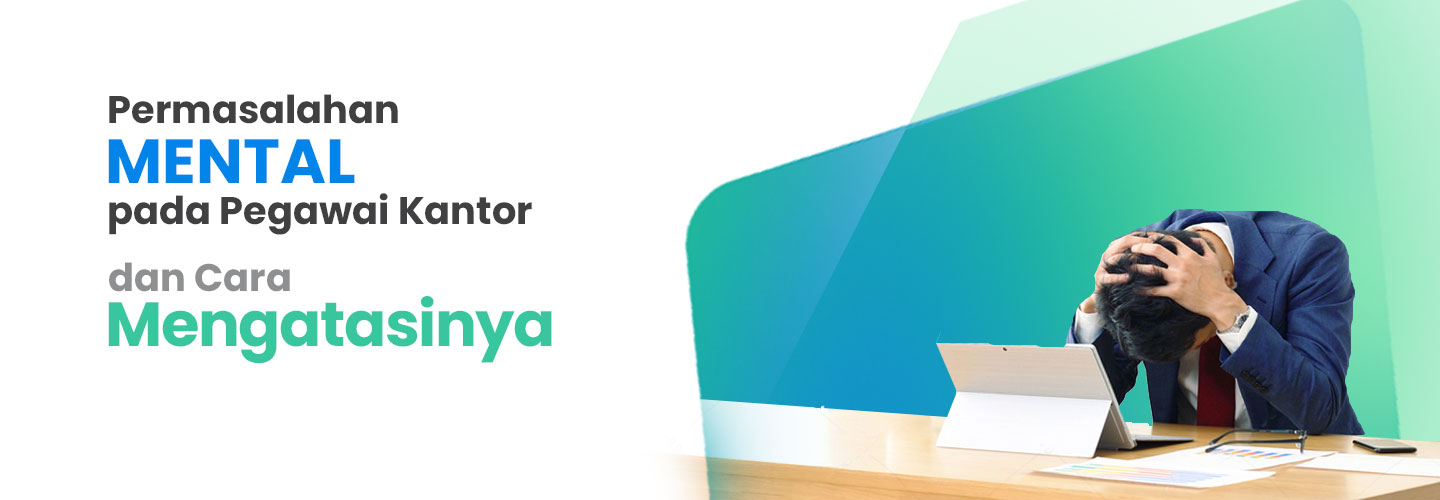Permasalahan Mental pada Pegawai Kantor dan Cara Mengatasinya

Banyak orang yang sudah tidak asing lagi saat mendengar istilah “mental health”, terutama saat pandemi. Rasanya isu ini semakin marak dibicarakan di berbagai tempat. Meskipun kesadaran masyarakat akan pentingnya mental health atau kesehatan mental semakin meningkat, ternyata masih banyak juga yang menganggap isu ini sebagai hal yang tabu.
Pandangan seperti ini muncul karena masih rendahnya pemahaman masyarakat atas kesehatan mental dan terbatasnya akses terhadap layanan kesehatan mental. Berdasarkan data dari Riset Kesehatan Dasar (Riskesdas) di tahun 2018, fakta menunjukkan sebanyak 19 juta penduduk Indonesia di atas usia 15 tahun mengalami gangguan kesehatan mental.
Permasalahan kesehatan mental ini bisa terjadi pada siapa saja, tanpa memandang jenis kelamin maupun pekerjaan. Adapun pekerja kantoran merupakan salah satu pihak yang juga rentan mengalami gangguan kesehatan mental.
Penyebab Masalah Mental pada Pegawai
Dilansir dari Kompas.com, tuntutan besar akan pekerjaan ditambah kondisi lingkungan kerja yang tidak sesuai dengan keinginan maupun gaji yang tidak mencukupi berpotensi memicu permasalahan mental pada pekerja. Permasalahan yang semakin kompleks itu sangat mungkin menyebabkan para pekerja untuk merasa frustrasi dengan pekerjaannya.
Pandemi Covid-19 pun turut memberikan dampak terhadap kesehatan mental para pekerja kantor. Berbagai perubahan yang mengharuskan semua orang beradaptasi dengan kondisi baru memberikan efek psikologis seperti melemahnya perekonomian dan pengangguran, berkurangnya kesempatan untuk berinteraksi sosial, hingga kekhawatiran akan kesehatan.
WHO pun mulai mengimbau setiap tempat kerja agar mulai menaruh perhatian akan kesehatan mental serta memberi dukungan psikologis kepada karyawannya. Berikut ini merupakan beberapa permasalahan kesehatan mental yang pada umumnya terjadi pada pekerja kantor.
-
Depresi: gangguan suasana hati yang bisa disebabkan oleh faktor biologis ataupun tekanan stres berkepanjangan. Pekerja yang mengalami depresi seringkali kehilangan semangat kerja ataupun emosi yang tidak stabil.
-
Gangguan kecemasan: pada pekerja kantor gangguan ini umumnya menimpa mereka yang bekerja di bawah tekanan dan mengalami stres. Gangguan ini seringkali ditunjukkan dengan meningkatnya denyut jantung, berkeringat, kesulitan bernapas, hingga sulit berkonsentrasi.
Kesehatan mental pekerja kantor bukanlah suatu hal yang dapat dianggap sepele. Apabila diabaikan, ternyata permasalahan ini akan berimbas pada kinerja pegawai. Berikut ini merupakan aspek yang akan terdampak dari permasalahan mental karyawan:
-
Performa dan produktivitas
-
Kemampuan seseorang dalam menangani pekerjaan
-
Pola komunikasi dengan sesama karyawan atau rekan bisnis
-
Kondisi fisik dalam menjalankan aktivitas sehari-hari
Cara Mengatasi Masalah Mental untuk Karyawan
Meskipun terlihat sebagai hal yang sepele, masalah kesehatan mental akan berdampak buruk jika tidak ditangani dengan baik. Secara tidak langsung, pengaruhnya akan berdampak juga pada performa perusahaan secara keseluruhan.
Tentu saja terdapat berbagai langkah-langkah yang dapat ditempuh oleh Anda sebagai pemimpin perusahaan dalam mengatasi masalah kesehatan mental pegawai. Beberapa langkah tersebut antara lain.
-
Membangun budaya mental sehat di lingkungan kerja
Membangun lingkungan kerja yang mendukung kesehatan mental membutuhkan suatu sistem pendukung yang kuat pula. Para atasan harus memiliki pemahaman dan kesadaran yang sama akan hal ini. Perusahaan juga dapat memberikan self-assessment tools bagi pegawai hingga menawarkan layanan kesehatan.
Selain itu, tidak kalah penting bagi perusahaan untuk memberikan edukasi bagi karyawan akan pentingnya isu ini. Pemberian pemahaman bisa dilakukan melalui seminar/workshop bertema kesehatan mental seperti teknik pengelolaan stres dan mindfulness.
-
Menghindari toxic positivity
Toxic positivity terjadi akibat adanya anggapan bahwa seorang pegawai harus dapat menunjukkan emosi positif di setiap waktu. Memberikan layanan terbaik saat bekerja memang merupakan hal yang sangat baik. Namun, setiap pegawai pun sangat wajar apabila merasa tidak baik-baik saja. Karena itukah, setiap lingkungan kerja harus memberikan kesempatan para pegawainya untuk mengekspresikan perasaan tidak nyaman atau mengutarakan permasalahan yang dihadapinya.
-
Memberikan jeda atau waktu rehat sejenak
Di masa pandemi ini, semakin banyak perusahaan yang memberikan kelonggaran para pegawainya untuk tidak selalu harus bekerja dari kantor. Hal ini salah satunya bertujuan untuk memberikan kesempatan para karyawan untuk beristirahat atau menyelesaikan permasalahan yang sedang dihadapi.
Situasi pandemi tidak dapat dipungkiri merupakan masa sulit yang tengah dihadapi bersama. Untuk itu, perusahaan pun sebaiknya memahami hal tersebut dan menunjukkan empati pada karyawannya yang membutuhkan waktu untuk memulihkan diri.
Agar dapat mengembangkan talent yang unggul di sebuah perusahaan, Anda juga bisa mengelola pemahaman karyawan atas kelemahan dan kekuatan dirinya. Hal ini bisa dilatih melalui program Self-Leadership: Personality Perspective. Melalui pelatihan ini, peserta diharapkan dapat memimpin dirinya sendiri dan memahami anggota tim secara personal.
Bila Anda tertarik untuk memahami cara mengelola stress selama pandemi, Anda dapat mengikuti pelatihan Self Leadership: Personality Perspective. Di dalam pelatihan ini Anda akan diajak untuk memahami ciri dan cara mengelola stress baik untuk diri sendiri maupun orang lain, termasuk anak buah Anda.